Have you ever thought about quitting your job? I’m sure this thought crosses most people’s minds from time to time.
There’s no question that people across generations are seriously evaluating what’s important to them in their careers right now, but these numbers are somewhat staggering: CNBC found that more than half of US workers are thinking about leaving their job.
Gone are the days when we devoted our lives to one company for long stretches of time. So, what can keep us motivated, willing to withstand the hard days, and showing up daily to battle it out in the trenches?
It’s feeling like we have an ally.
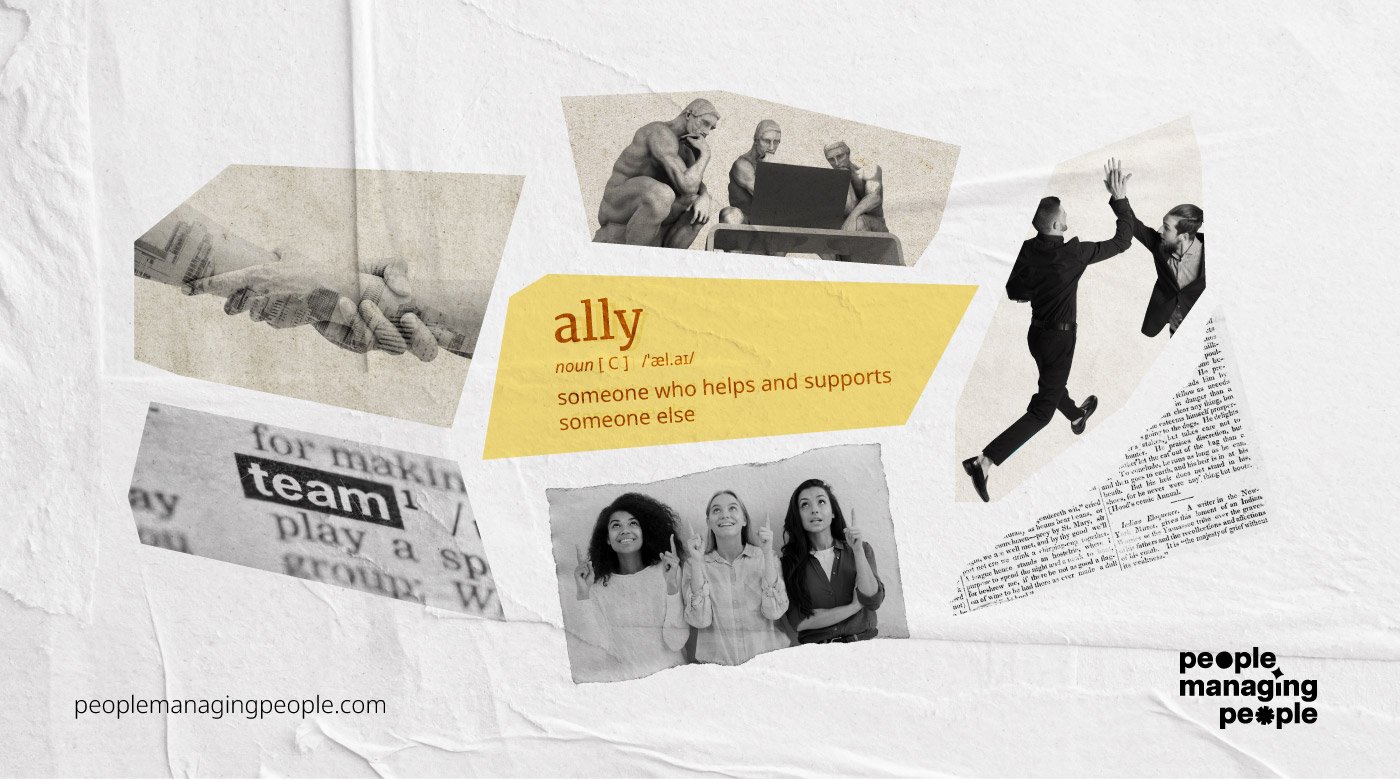
An ally is someone who understands us, knows us for our strengths, and stands behind us without judgment or hidden motives. We all deserve to have an ally—that’s why the most important role anyone can play in the workplace is the ally.
As a DEI Practitioner and Learning and Development professional, I’m passionate about the employee experience. I spend my days thinking about how we can all evolve the world of work through a lens of justice, social equity, and inclusion.
While people managers are at the crux of these efforts, directly accountable for a diverse and inclusive team culture and well-positioned for lasting change, each and every person can choose to be a better ally in 2025.
So, if you’re looking for ways to level up your allyship skills in 2025, read on to learn more about:
I’ll cover:
What Is Allyship?
Allyship aligns with the relationship-oriented activism bell hooks writes about.
She writes, “We learn to value loyalty and a commitment to sustained bonds over material advancement. While careers and making money remain important agendas, they never take precedence over the valuing and nurturing of human life and well-being”.
Allyship is an authentic alliance. It’s an active and intentional connection with another person. To be a real ally for someone is to empathize with them—to act as if whatever they’re going through is happening to you.
Allyship must become synonymous with the ethics we value most in the workplace. Original definitions of allyship refer to allies as being countries in support of other countries who are at war. Nowadays, we hear the word used commonly across social justice movements, and, like many words we hear in movement space, the validity and relevance of this word are hotly debated.
The biggest criticism the term allyship has received is that it doesn’t imply impact, thus being ineffective. So, let’s revisit the term to see if we can inspire impact or, better yet, evolve the meaning to help us become better allies.
Merriam-Webster includes this list of synonyms for the word ally.
Like hooks writes, allyship values loyalty. We are authentically loyal to those who stand up for us, advocate for us, and fight for our successes, and loyalty is the result of a culture where respect, care, trust, and commitment are present.
It’s important to see the distinction between loyalty and codependency too, as loyalty doesn’t imply someone being dependent on others. That’s why another word I used to describe an allied relationship is sovereign. I love this because it acknowledges that allyship does not imply control or manipulation, but an empowered dynamic.
Effective allyship doesn’t breed sameness. Instead, it nurtures two different people to walk the path together as individuals.
Finally, there are no self-proclaimed allies. A person can only be deemed an ally by another person. That’s because it’s solely characterized as having a real, definable impact on another person.
The Role Allyship Plays In Inclusive Workplaces
We’re all fighting different battles every day. That’s why allyship is the most important role we can play in the workplace.
Allies act with care, respect, responsibility, commitment, trust, and knowledge. They help create more diverse, equitable, and inclusive workplaces by ensuring people, particularly those from underrepresented groups, are treated fairly and by creating a culture of belonging.
As an ally, you may not fully understand or relate to the lived experience of someone with a marginalized identity. Whenever you’re in doubt about how to be an ally, ask yourself the question, what if it was me that was going through this?
If you’ve never been in the same position as the individual, that’s key information for your own self-awareness and a green flag to hold space for that person. Allies let empathy and compassion guide their actions.
Navigating turbulence in the workplace like racism, sexism, and other harmful biases is a critical aspect of allyship. Strong allies can leverage their own privilege by advocating for those on the receiving end of harm and not letting their own anxieties result in avoiding the issue.
There will always be ambiguity during culture change and as we push for more equity across organizations. Developing strong allies can lead to well-supported, cohesive teams.
Skills To Work On To Be A Better Ally
Allyship requires us to examine our entire skill set as professionals, and the top skills employers are looking for in 2025 are largely behavioral. Commonly referred to as “soft skills”, relational skills like teamwork and collaboration, intercultural sensitivity and competency, and emotional intelligence are increasingly in demand, and this is allyship.
So, allyship and our ability to understand and relate to others, extend empathy and compassion, and skillfully navigate turbulence and ambiguity are highly regarded by employers looking to design equitable and inclusive organizations.
Let’s explore 3 practical skills to be a better ally: cultural competency, feedback (giving, asking for, and receiving), and authentic relationship building. These are skills that any person can develop, regardless of being a manager or individual contributor.
Consider these 3 skill sets to strengthen your impact as an ally.
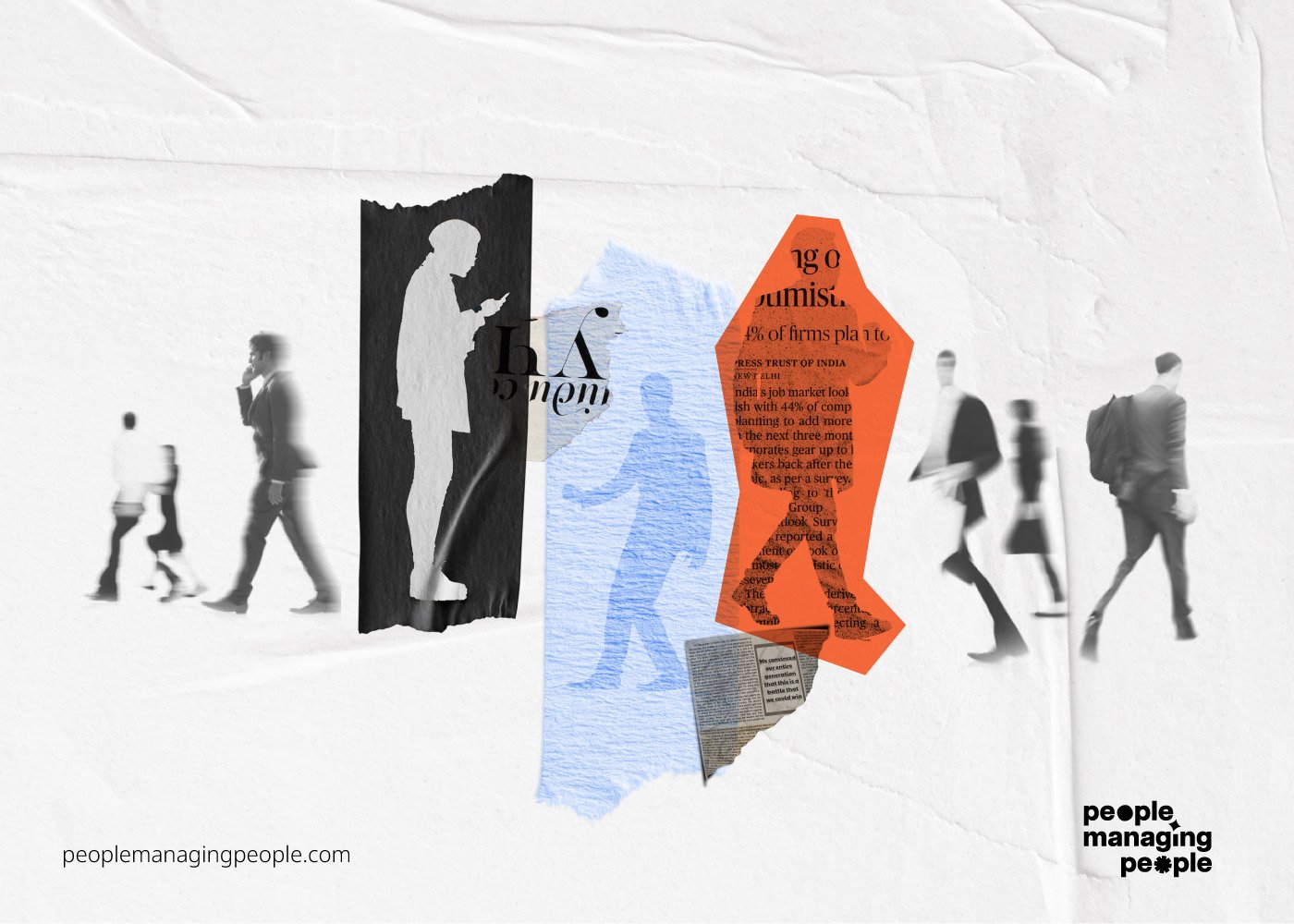
Cultural competence
When I use the word cultural here, I’m not referring to workplace culture, but literal cultural differences in humanity. This can be an important distinction when leveling up as an ally.
If you’re a manager and you don’t think cultural competence applies to you, you have a significant gap in your priorities—you simply aren’t considering diversity, equity, and inclusion in your hiring process as much as you think you are.
If you’re an individual contributor, leveling up in your cultural competence is a critical element to your contribution to a high-performing, cohesive team.
Project Ready, an online professional development platform grounded in equity and justice, defines being culturally competent as those who understand, communicate with, and effectively interact with people across cultures.
Cultural competence encompasses:
- Being aware of one’s own worldview
- Developing positive attitudes toward cultural differences
- Gaining knowledge of different cultural practices and worldviews
- Developing skills for communication and interaction across cultures.
Cultural competence is the ethics of care, respect, responsibility, commitment, trust, and knowledge we outlined earlier in action.
These 8 human competencies are a good start to becoming culturally competent:
- Understanding and honoring the histories, cultures, languages, and traditions of diverse communities
- Valuing the different abilities and interests of diverse communities
- Respecting differences in the home lives of diverse communities
- Building on the different ways of knowing and expertise found in different cultures and communities
- Recognizing that diversity contributes to the richness of our society and provides a valid evidence base about ways of knowing
- Understanding that a strong sense of cultural identity and belonging is central to developing positive self-esteem
- Identifying and challenging personal cultural assumptions, values, and beliefs
- Demonstrating an ongoing commitment to developing their own cultural competence.
As you hire new people on your team or get to know your current direct reports better, let your 1 on 1 meeting with them be an opportunity to learn about them in this way.
Regardless of your role, set aside the demands of the job and get curious about the backgrounds, families, traditions, and values of your colleagues.
Giving, asking for, and receiving feedback
We know that feedback is crucial for our growth and personal development, and I’m proposing that feedback skills are truly what makes anyone an outstanding ally.
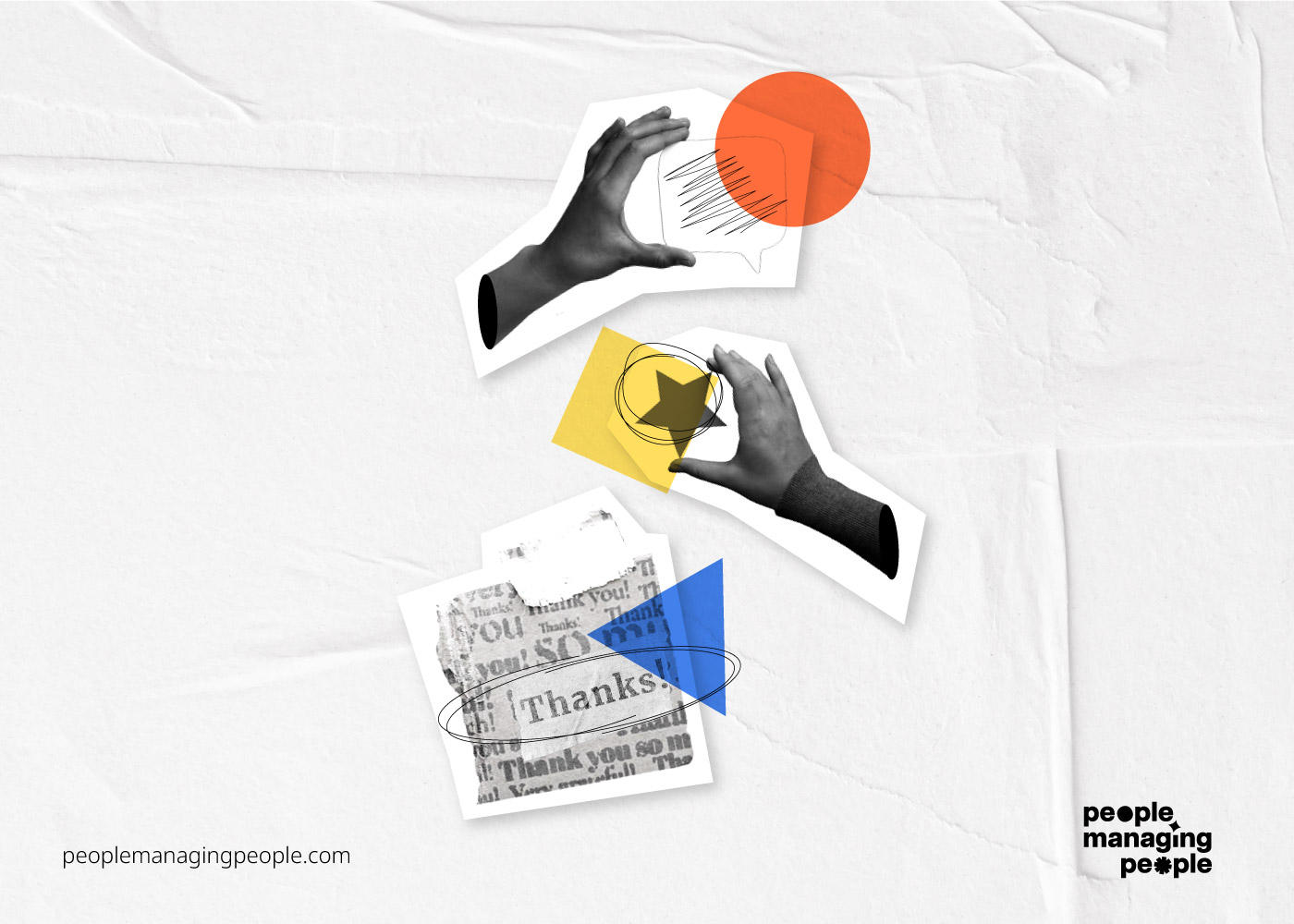
A person's ability to give and receive empathetic feedback (especially difficult), holds the potential to bring the change organizations need to achieve greater diversity, equity, and inclusion.
In all my years as a DEI practitioner, I’ve seen countless initiatives for more sensitivity training, unconscious bias training, and extreme shifts to call out culture—especially with social media on the rise as an increasingly visible way to learn about what language and behavior is and what is no longer acceptable in our workplaces.
To me, this exacerbates an already inflamed problem by putting the focus on what we now know to be weaponized incompetence—where someone’s ignorance and newfound awareness of their contribution toward another’s experience of racism, sexism, homophobia and more become front and center in the conversation. Maybe this was an effective strategy at one point to bring attention to these issues, but it’s time to evolve.
Now, so many people are terrified of saying the wrong thing that they just say (and do) nothing.
The truth is, it’s extremely difficult to stay completely current with how language is evolving every day. So, instead of being scared into silence (or worse, apathy), what if we built our workplaces around cultures of feedback?
Let’s equate feedback with the currency of the ethics we’re discussing: care, respect, responsibility, commitment, trust, and knowledge.
Next, we’ll explore each aspect of feedback: giving, asking for, and receiving.
Giving Feedback
Let’s start with the most challenging aspect of allyship—speaking up and advocating during times of injustice, particularly when the injustice isn’t happening directly to you.

We can frame this skill set as managing up, which is something anyone can benefit from learning to do.
The first step of giving effective feedback as an ally is to become better at identifying the moments of injustice.
Here are some things to start noticing about where you work. Take a mental inventory of how your culture operates and the gaps.
- Are there knowledge gaps, blind spots, or biases in daily operations? (hint: there always are.)
- Do you see opportunity gaps (e.g. patterns of people getting hired and promoted, patterns of people getting invested in, certain folks accessing available opportunities, or straight-up pay inequity)?
- Do you notice minimal representation or disenfranchised voices (e.g. what do leadership teams look like, who speaks the most in meetings, who’s always taking the notes)?
- What would the attendance be like if you were to host a workshop with your colleagues to discuss topics affecting race, gender, abilities, experiences, or backgrounds?
- Do you and others believe all opportunities in the company are open to anyone who is qualified?
Then, start noticing how these or other dynamics contribute to a culture of oppression in the workplace.
It’s important to remember that, in a situation where someone has caused or is causing harm to another, it’s the result of harmful systems, not that of one individual in that moment.
Here’s an example.
Let’s say you’re on a team that has done some hiring in preparation for the selling season. Your manager has onboarded an employee who is a person of color and is working remotely/locally based in the sales region.
This new hire has recently changed industries and has a lot to learn in their new role. Typically, in any industry, it takes 6 months to 1 year to ramp up in a new role—particularly in a sales role where you’re building new relationships and learning new products or services.
However, there are people on the team, including that person’s manager, who consistently backchannel and speak poorly of this person’s performance, who, after only 3 months, hasn’t yet become self-sufficient in the job.
In my experience as a DEI practitioner, employees of color and women are more commonly measured by their present-day performance and not their potential. The system in place judges them more harshly and invests in them less. These types of scenarios are key opportunities for allyship.
As an ally, how could you use your feedback skills to advocate for this new hire?
Dr. Marshall Rosenberg is well known for his teachings on non-violent and compassionate communication, where we ground difficult conversations in our observations, feelings, needs, and requests.
He founded the Center for Nonviolent Communication (NVC), whose mission is about “connecting with ourselves and others from the heart. It’s about seeing the humanity in all of us. It’s about recognizing our commonalities and differences and finding ways to make life wonderful for all of us.”
Compassionate communication is a deeply intentional and effective way of speaking to one another in times of turbulence.
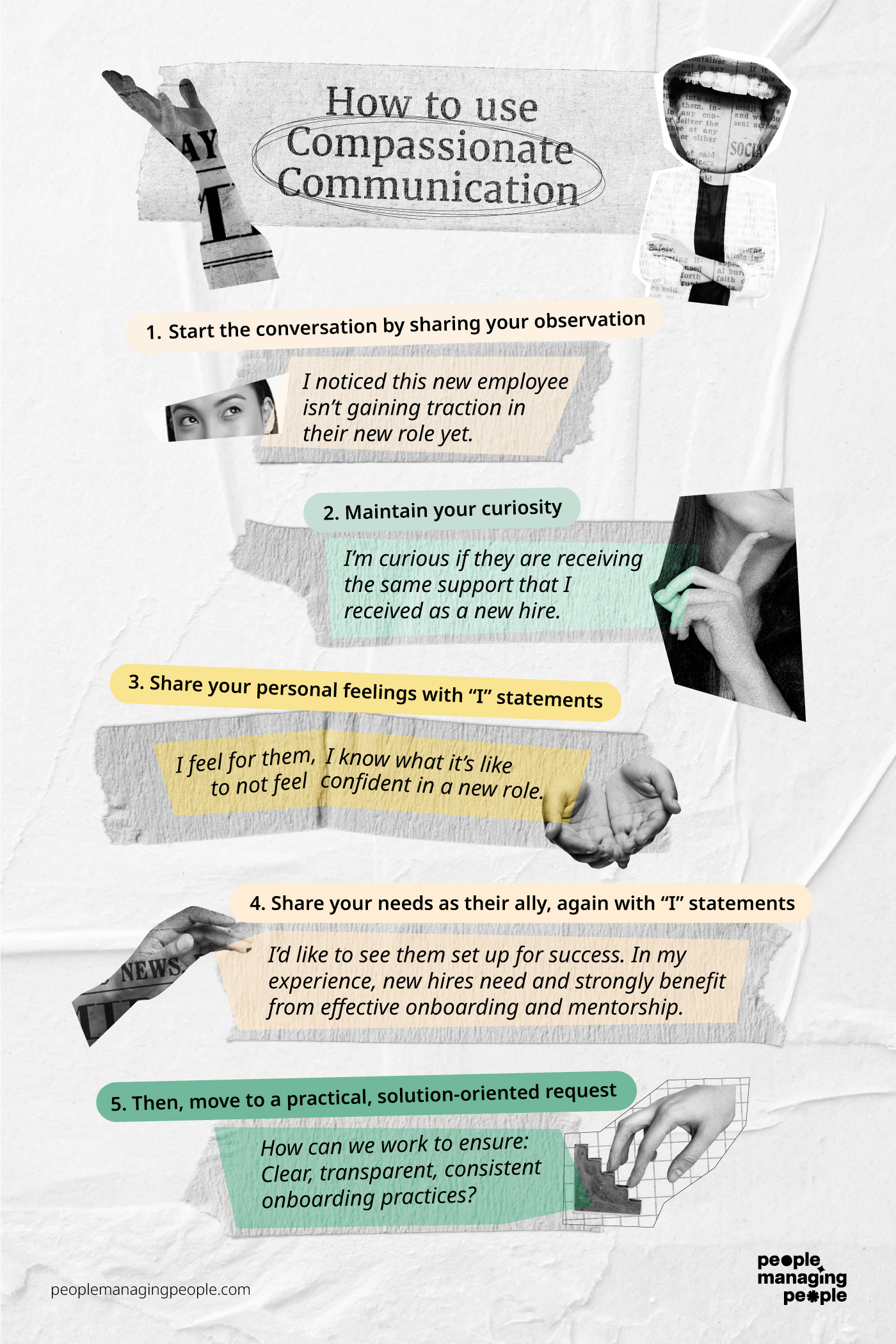
You could start the conversation by sharing your observation: “I noticed this new employee isn’t gaining traction in their new role yet.”
Then, maintain your curiosity: “I’m curious if they are receiving the same support that I received as a new hire.”
Then, share your personal feelings with “I” statements: “I feel for them, I know what it’s like to not feel confident in a new role.”
Then, share your needs as their ally, again with “I” statements: “I’d like to see them set up for success. In my experience, new hires need and strongly benefit from effective onboarding and mentorship.”
Then, we move to a practical, solution-oriented request: “How can we work to ensure:
- Clear, transparent, consistent onboarding practices
- Tolerance for people who have different needs
- Mentorship and collaboration on creative solutions for support?”
Once you’ve made it this far, remember, you’re simply stating an observation and opportunity for growth—you’re also demonstrating that you’re invested in collective success and want to see everyone thrive.
This can be a powerful approach to managing up or across teams, and, ideally, you’re giving this feedback directly to someone who can influence these systems (a manager or HR).
Giving Feedback as a Manager
What if you’re the manager who’s preparing to give feedback to their direct report on their performance, and you want to establish yourself as their ally?
Well, let’s be honest, when performance review time comes around, how confident are you in your ability to give effective feedback? Is it the only time of year you give feedback? Therein lies the problem.
In my experience as a direct report, the quality of feedback I’ve come to expect from my managers over the years comes across as a last-minute effort and a major missed opportunity to demonstrate their commitment as my ally.
So, when it comes to delivering feedback to individuals on your team, see this as the perfect opportunity to show them you’re an ally and invested in their growth, potential, and success.
In a recent piece from Fast Company, the author aligns feedback with allyship,
“As leaders, we need to go beyond feedback and shift our focus from critic to ally. When you’re someone’s ally…you display caring for them, confidence in them, and commitment to them. In your presence, they drop shame and defensiveness, and instead focus on becoming better.”
Here are 3 things to consider when giving feedback to your direct reports, or managing up to other leaders to help them see you as their ally:
- Show empathy. When faced with challenges, let them know you understand how difficult, annoying, and frustrating this moment must be.
- Express your confidence in them. Show that you believe in their ability to handle struggles reinforces their own self-assurance.
- Be collaborative/offer to brainstorm together. But first, make sure to ask permission. Then, ask them if they would be willing to think with you about the situation and solutions that they believe they could be successful in.
Giving strong feedback takes lots of practice, and it’s fair to say that not every manager has the bandwidth consistently throughout the year to give the knowledgeable and caring feedback every person deserves.
So, managers, if you take one thing away from this section, let it be this: tell your direct reports that they’re doing a good job more often. Let it come from an authentic place, but if you feel that they’re doing well—tell them. So simple, yet often missed. No one hears it enough.
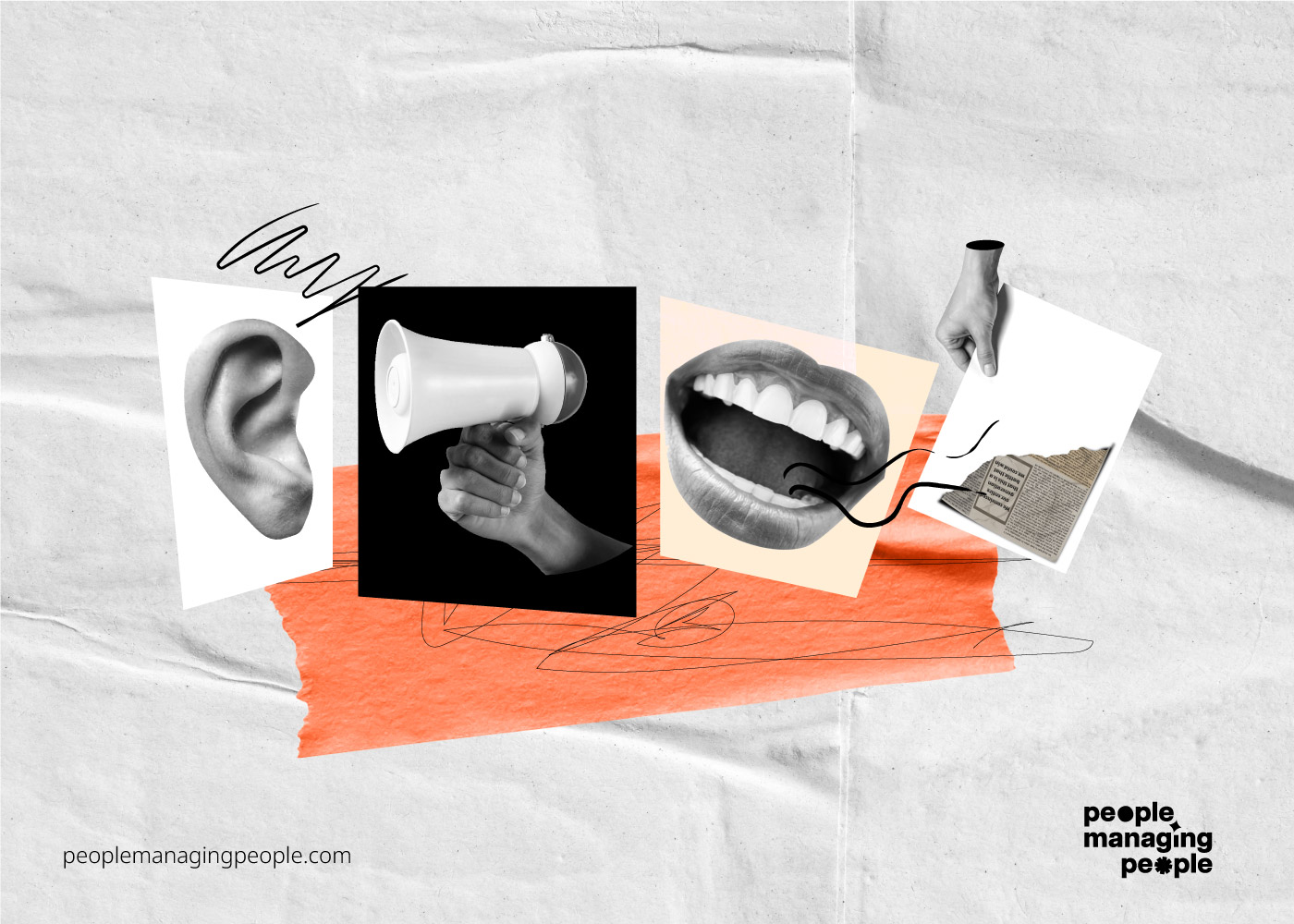
Asking for Feedback
Remembering to ask for feedback is a habit we can easily forget to maintain. As a manager, having structural practices to elicit honest feedback from your team can help you prioritize doing it (before it’s too late and you receive their letters of resignation).
Stay interviews (versus exit interviews) are a simple tactic for eliciting feedback from the people on your team who have displayed their loyalty to you. It’s a great way to clearly understand what you’re doing right and hold space for opportunities for improvement.
Stay interviews can help:
- Build trust between managers and their team members
- Engage with employees to show their opinions are valued
- Learn why employees want to continue working for the company and why they might want to leave
- Find out if there are any issues that should be resolved between the employee and any of their superiors or team members
- Understand the employee’s stance on their current position and what they’d like to have changed
- Determine what challenges employees appreciate and what motivates them to work toward the organization’s mission
- Gain a better understanding of the employee’s unique fears, dreads, hopes, and strengths
- Gather actionable information about current and upcoming employee trends in the office.
All of this is valuable data for being a committed ally to your direct reports. You’ll build trust, better understand their needs, and become armed with information to better support your team.
Now, if you’re an individual contributor looking to get feedback around your allyship, rest assured, the more you put yourself out there, advocate for others, and speak up against injustices, it will come.
As an individual contributor, you may not have the structural power to elicit regular and consistent feedback, however, if you are:
- Actively demonstrating your cultural competence of others
- Skillfully delivering direct feedback to those complicit in doing harm
- Hosting DEI workshops, book clubs, or events at your company
- Serving on committees and ERGs
- Writing publicly on social media about social issues
- Getting to know people different from you on a personal level
- Most importantly, operationalizing your DEI values and behaviors.
You’ll 100% hear about it from others.
Once immersed in the work of allyship, other people will undoubtedly notice your efforts, and you will receive everything from criticism to praise. The important thing to remember is to not let the criticism stop you or the praise turn you complacent. If no one notices your efforts, that’s feedback too!
Something to consider might be, who’s the feedback from?
Most likely, you’ll receive feedback (positive and negative) from people from ethnically advantaged groups also examining their allyship. People love to point fingers at others for not getting it right!
If you’re receiving earnest feedback from employees of color, women, or any historically disadvantaged group, congrats—you’re making an impact. If it’s negative feedback, this next part is for you.

Receiving Feedback
There will be times when people have feedback for your allyship. See this as a good thing.
You likely haven’t perfected your allyship and, truth is, no one will. It will always require growth and lifelong learning. We’re never done!
Remember, feedback equals respect (and care, responsibility, commitment, trust, and knowledge—all the things we’re working towards in our work ethic of allyship).
There’s a science to processing the feedback we choose to accept and it also takes some practice. Receiving feedback is hard—we know this, but it’s a critical skill in allyship and no one is exempt.
Organizational Psychologist, Dr. David Burkus compiles four simple and highly effective tips for how to get better at receiving feedback.
- Don’t get defensive: choose gratitude
- Actively listen: restate what you heard
- Acknowledge the changes: figure out how to apply them
- Rinse and repeat: seek out more feedback.
Ego has no place in our workplace anymore. Let’s stop with the fake it ‘til you make it narrative—we’re all learning and growing and no one's perfect. Humility goes a long way.
Interpersonal Relationship Building

There’s no question that things like clear and honest communication, consistent practices and procedures, and grounded expectations of one another are all vital to healthy relationship building between managers and the individuals on their team.
That being said, one aspect of relationship building that so often gets missed is initial and ongoing efforts to build trust.
Building trust, early and often, is the most critical first step for anyone on this journey of allyship, regardless of your title, as trying to earn or repair lost trust later is far more difficult.
I rely heavily on Brene Brown’s BRAVING Trust concept. She presents an increasingly practical way of establishing trusting relationships from the start. To be an ally is to strive to meet each of these qualities whenever possible.
From Dare to Lead |The BRAVING Inventory - Brené Brown
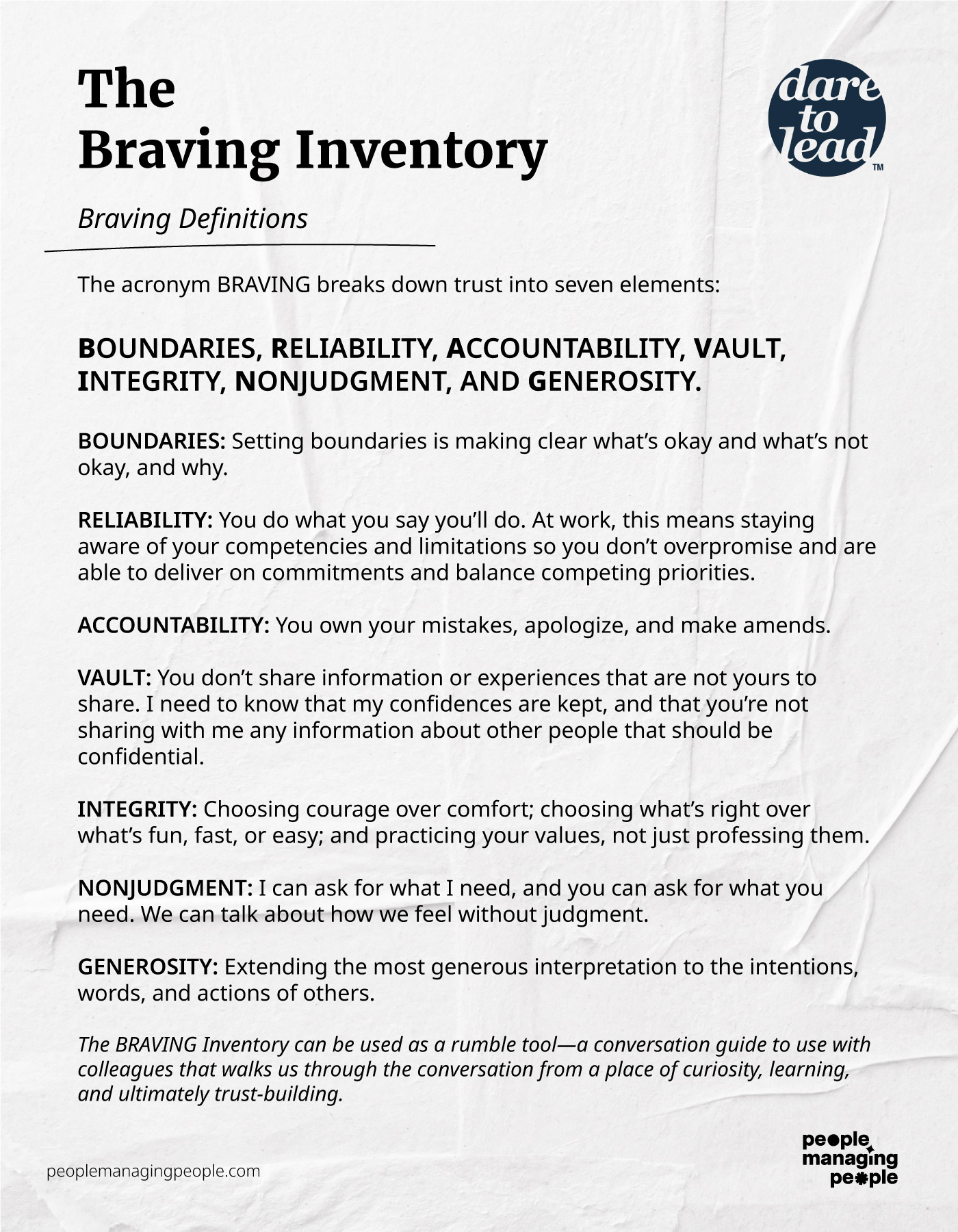
Print this out and look at it every day. In almost any situation, there’s a behavioral decision you can make to be increasingly trustworthy to others.
Allyship as a Work Ethic
You heard it here first, allyship is the top skill of 2025 and beyond. So, let your allyship skills be a part of your professional development plan this year.
Furthermore, let’s push for systemic change and redefine what a good work ethic means with allyship.
We know that the values of an organization’s culture and ethics shape the way we speak to and treat each other, so let’s expand allyship beyond our interpersonal relationships and collectively define allyship as the only acceptable work ethic and the primary system of values we use to define world-class organizational culture.
If you found this article useful, subscribe to the People Managing People newsletter and receive regular content to help you progress in your career and build healthy, productive workplaces.

